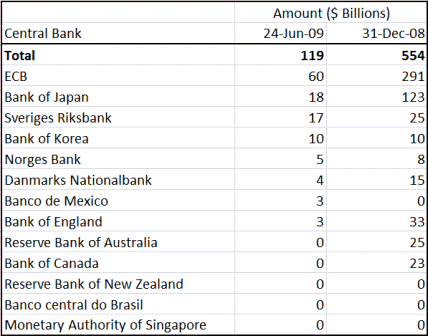[Skip to the end]
The ECB remains way ahead of the fed regarding monetary operations.
It has been setting rates and letting quantity adjust and now addresses
unfounded concerns of ‘exit strategies’ head on.
(I take issue only to the extent of the potential inflationary implications and influence on growth and employment of interest rate policy in general, but that’s another story.)
The covered bond purchase could have utilized a rate target rather than a quantity target but their policy might not be to target a specific rate.
Also note they accept collateral down to a bbb rating from their member banks, which is includes bank paper and is functionally very close to unsecured lending- a policy that i have been suggesting would have served the fed well from the beginning of the crisis.
Trichet Sees Automatic Exit From ECB’s Non-Standard Measures
June 5 (Bloomberg) — European Central Bank President Jean- Claude Trichet said banks will seek less credit from the ECB when the economy improves, automatically reducing the amount of money in the system and ensuring a non-inflationary recovery.
By concentrating its non-standard policy measures on the supply of unlimited liquidity to banks, the ECB has ensured it has “an in-built exit strategy,†Trichet said in a speech in Warsaw today. “That is, when tensions in financial markets ease, banks will automatically seek less credit from the ECB.
This will be a decisive element in ensuring a non-inflationary recovery.â€
The Frankfurt-based ECB, which has cut its benchmark interest rate to a record low of 1 percent, has said it will loan banks as much money as they need for up to 12 months and pledged to buy 60 billion euros ($85 billion) of covered bonds in an effort to revive lending. The ECB yesterday lowered its economic forecasts for this year and next. It now expects the economy of the 16 nations using the euro to shrink by about 4.6 percent this year before returning to positive quarterly growth rates by mid-2010.
“Once the macroeconomic environment improves, the Governing Council will ensure that the measures taken can be quickly unwound and the liquidity provided absorbed,†Trichet said. “Hence, any threat to price stability over the medium and longer term will be effectively countered in a timely fashion.â€
Merkel’s Warning
German Chancellor Angela Merkel on June 2 scolded the Federal Reserve and Bank of England for pumping too much money into their economies and said that by deciding to buy covered bonds, the ECB had “bowed somewhat to international pressure.â€
She urged a return to a “policy of reason.â€
Trichet said the ECB’s “bold yet solidly-anchored response†to the worst economic crisis since World War II is “encouraging.†While long-term inflation expectations remain anchored around the ECB’s 2 percent limit, “our measures show some signs of revival in the functioning of money markets in Europe,†he said.
Trichet added that the crisis has not altered the ECB’s primary objective of maintaining price stability. “This objective will always provide the context and limits within which our course of action is framed and enacted.â€
by Neil Unmack
June 4 (Bloomberg) — The European Central Bank will start buying 60 billion euros ($85 billion) of three- to 10-year covered bonds from July, President Jean-Claude Trichet said.
The central bank will buy bonds rated at least BBB- in the primary and secondary markets until June 2010, but doesn’t plan to purchase other assets, the ECB said after policy makers held interest rates at a record-low 1 percent. The ECB said on May 7 it will buy covered bonds in a bid to revive the market, which lenders use to finance mortgages and public-sector loans.
Covered bond issuance increased after the ECB announced the purchase program last month, with banks selling 26.8 billion euros of the debt, according to data compiled by Bloomberg. The $2.8 trillion market had been roiled by the credit crisis, and sales had halved to 48.6 billion euros by May 7, compared with 99.4 billion euros in the same period a year earlier.
“It’s supportive for the primary and secondary covered bond market,†said Leef Dierks, a credit analyst at Barclays Capital in Frankfurt. “We expect the issuance window to remain open, and believe that the positive momentum in the secondary market will continue.â€
To be included in the ECB’s purchase plan, covered bonds “must be eligible for use as collateral in the euro system’s credit operations,†Trichet said. The bonds must “have as a rule a volume of about 500 million euros or more and in any case not lower than 100 million euros,†he said.
Bond Eligibility
Bonds bought by the central bank must comply with the so- called UCITS directive, a European regulatory framework for mutual funds, or have “similar safeguards,†Trichet said, without being more specific.
“They want to get the most bang for their euro, and that means helping the bonds that will have the widest investor support in the market,†said Ted Lord, head of covered bonds at Barclays.
The ECB said it will buy bonds through “direct purchases†rather than following the Bank of England’s example of using auctions.
“We would like more clarity on how these direct purchases will work,†said Heiko Langer, a covered bond analyst at BNP Paribas SA in London. “Will we know how much they have bought, what they have bought, and at what price?â€
Regarding the euro region’s economy, Trichet said confidence may improve more quickly than has been forecast.
“Risks to the economic outlook are balanced,†he said. “On the positive side†there are “stronger-than-anticipated effects from stimulus measures underway and other policy measures taken. Annual inflation rates are projected to decline further and become negative over the coming months.â€
Covered bonds are backed by real-estate or public-sector debt and tend to have a higher rating than straight corporate bonds because they’re also supported by a borrower’s pledge to pay.
[top]


